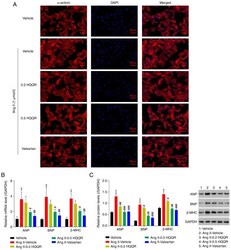Antibody data
- Antibody Data
- Antigen structure
- References [0]
- Comments [0]
- Validations
- Other assay [1]
Submit
Validation data
Reference
Comment
Report error
- Product number
- MA1-26180 - Provider product page

- Provider
- Invitrogen Antibodies
- Product name
- Cardiac Myosin Heavy Chain Monoclonal Antibody (3-48)
- Antibody type
- Monoclonal
- Antigen
- Other
- Description
- This antibody is myosin alpha and beta heavy chain specific. Affinity constants: Human ventricular myosin heavy chains - 3.33 x 108M-1; Human atrial myosin heavy chains - 1.48 x 108M-1; Human skeletal muscle myosin - 1.06 x 108M-1; Canine cardiac myosin heavy chains - 2.06 x 108M-1. This antibody cross-reacts with heavy chains of human myosin isolated from slow skeletal muscle, fast skeletal muscle, eye muscle, and streptococcal M5 peptide. It does not react with human platelets, smooth muscle myosin heavy chains, myosin light chains, myosin fragments circulating in blood of patients with myocardial infarction, nor does it react with any other human tissue antigens or blood cells. Recommended positive control: Slow skeletal muscle, fast skeletal muscle, eye muscle.
- Reactivity
- Human, Mouse, Rat, Bovine
- Host
- Mouse
- Isotype
- IgG
- Antibody clone number
- 3-48
- Vial size
- 100 μg
- Concentration
- 1 mg/mL
- Storage
- Store at 4°C short term. For long term storage, store at -20°C, avoiding freeze/thaw cycles.
No comments: Submit comment
Supportive validation
- Submitted by
- Invitrogen Antibodies (provider)
- Main image

- Experimental details
- Figure 2 HQQR improves Ang II-induced cardiomyocyte hypertrophy. (A) Immunofluorescence experiments were performed using anti-alpha-actinin antibodies to analyze cardiomyocyte hypertrophy (magnification, x200; scale bar, 50 um). (B) mRNA expression levels of the myocardial hypertrophy markers ANP, BNP and beta-MHC were examined using reverse transcription-quantitative PCR. (C) Protein expression levels of the myocardial hypertrophy markers ANP, BNP and beta-MHC were examined using western blotting. ** P
 Explore
Explore Validate
Validate Learn
Learn Western blot
Western blot Other assay
Other assay